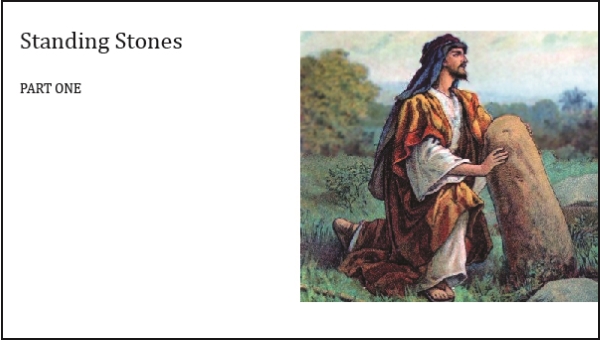By Tyson Thorne

Begin this week’s study by reading Genesis 28.10-.19 then come back here and keep reading. You’ll be glad you did.
Clearly when Jacob stopped to rest the place he chose to camp was unremarkable. It was an ordinary place, and he chose an ordinary stone for a pillow. This sounds uncomfortable but it doesn’t have to be. A properly shaped stone behind your neck can be wonderfully relaxing, especially at the end of a long journey. But I want to be sure we understand that there were no signs posted: “No Trespassing – Holy Ground!” There was nothing mystical about the stone he slept on; it held no magical powers. Yet in the light of the new day both the ground and the stone would be honored in a special way.
As Jacob slept the Lord came to him in a dream. God made him many promises. Yet of all the promises God made it wasn’t the thought of land or the descendents that excited me. What made me long to be in Jacob’s shoes at that moment was God’s last statement: “I will not leave you until I have finished giving you everything I have promised you.” To Jacob this must have seemed incredible. God would choose to be with a mortal for as long as it took to fulfill the promise. The nature of some of those promises made it clear: God was promising to be with Jacob to the end of his days. What a blessing!
When Jacob woke up he said something noteworthy, something I think every believer should hear and understand. About this completely unremarkable campsite Jacob said: “Surely the Lord is in this place, and I wasn’t even aware of it! What an awesome place this is! It is none other than the house of God, the very gateway to heaven!”
Apparently after this encounter he went back to sleep. I’m not sure how he did that, I think I’d be much too excited! I suppose as exhausted as he was from the full day hike he fell back to sleep. The next morning, however, he remembered everything clearly. We are told he got up early, stood his stone pillow on end and anointed it with oil. Oil was a precious commodity in that day and here he is pouring it generously over an ordinary stone. The act had a symbolic meaning of course, one that would mean something to him and cause others to wonder. Some translations say it was a “memorial pillar.” I prefer the more accurate rendering of a “standing stone” though they mean the same thing.
This isn’t the only time the Bible speaks of a standing stone. Often stones would be erected to mark the place of a significant encounter with God. The stones become a visible reminder to those who placed them there and to all who knew the story that this is a place where God communed with man and showed his love for him! When the children of Israel crossed the Jordan River on dry ground Joshua directed one man from each of the 12 tribes to take a stone from the center of the river channel to build a stack of standing stones. When the Philistine army returned the Ark of the Covenant, the rock upon which it had rested became an altar for sacrifices and a standing stone reminding Israel of God’s faithfulness. Over time Israel erected many standing stones; they were an important cultural aspect of their every day lives.
Today we do not build personal monuments to God’s faithfulness and presence. Yet the idea of standing stones remains and is practiced differently. Let’s say you’re shopping at the mall or grocery store when you bump into your pastor. What immediately starts running through your mind? Are you wondering if he saw you flip off that person in the parking lot who stole your parking place? Or maybe you’re wondering if he noticed you helping that elderly person out with their purchases? Either way, the pastor has become a standing stone to you. He has reminded you of God’s presence and work in your life.
|
|
|